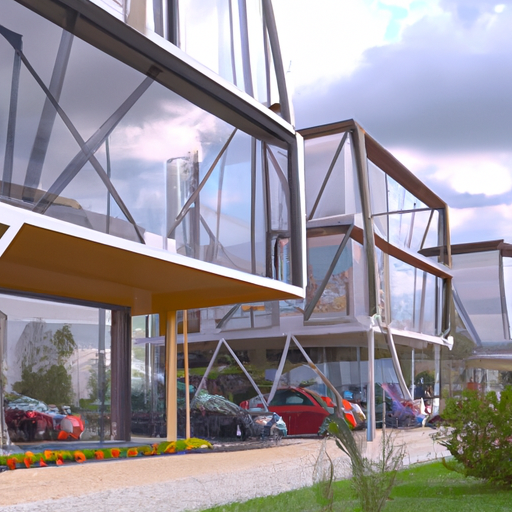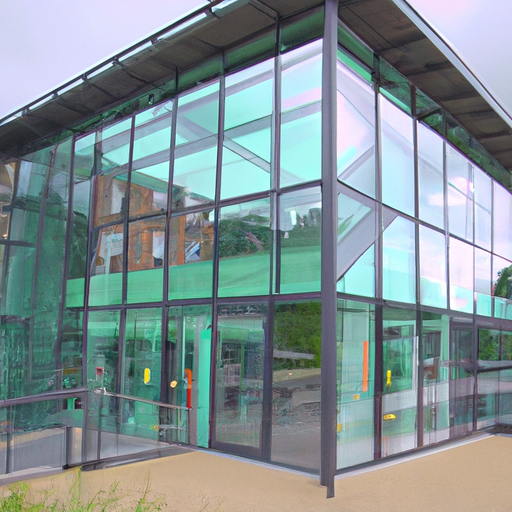
The Sustainable Design Features of voco Zeal Exeter Science Park
voco Zeal Exeter Science Park is a groundbreaking hotel that is leading the way in sustainable design. With its commitment to being a net zero carbon hotel, voco Zeal is setting a new standard for environmentally friendly accommodations. In this article, we will explore the sustainable design features that make voco Zeal Exeter Science Park a truly innovative and eco-friendly hotel.
One of the key features of voco Zeal’s sustainable design is its use of renewable energy sources. The hotel is equipped with solar panels that harness the power of the sun to generate electricity. These solar panels not only provide clean and renewable energy, but they also help to reduce the hotel’s carbon footprint. By utilizing solar power, voco Zeal is able to significantly decrease its reliance on fossil fuels and contribute to a more sustainable future.
In addition to solar power, voco Zeal also incorporates energy-efficient technologies throughout the hotel. LED lighting is used throughout the property, which consumes significantly less energy than traditional incandescent bulbs. This not only reduces energy consumption but also lowers the hotel’s electricity costs. Furthermore, the hotel utilizes smart thermostats that automatically adjust the temperature based on occupancy and time of day, ensuring optimal energy efficiency.
Water conservation is another important aspect of voco Zeal’s sustainable design. The hotel features low-flow plumbing fixtures, such as toilets and faucets, which help to minimize water usage without sacrificing comfort. Additionally, the hotel has implemented a rainwater harvesting system that collects and stores rainwater for non-potable uses, such as irrigation and toilet flushing. By reducing water consumption and utilizing rainwater, voco Zeal is able to conserve this precious resource and minimize its impact on the environment.
The materials used in the construction of voco Zeal Exeter Science Park also contribute to its sustainability. The hotel incorporates recycled and locally sourced materials whenever possible, reducing the need for new resource extraction and minimizing transportation emissions. Furthermore, the building is designed to maximize natural light and ventilation, reducing the need for artificial lighting and air conditioning. This not only reduces energy consumption but also creates a more comfortable and pleasant environment for guests.
voco Zeal Exeter Science Park is also committed to waste reduction and recycling. The hotel has implemented a comprehensive waste management system that includes recycling bins in guest rooms and public areas. Additionally, the hotel partners with local organizations to compost organic waste, further reducing the amount of waste sent to landfills. By prioritizing waste reduction and recycling, voco Zeal is able to minimize its environmental impact and contribute to a more circular economy.
In conclusion, voco Zeal Exeter Science Park is a groundbreaking net zero carbon hotel that showcases the future of sustainable design. From its use of renewable energy sources to its water conservation efforts, the hotel incorporates a range of innovative features that prioritize environmental responsibility. By staying at voco Zeal, guests can enjoy a comfortable and luxurious experience while knowing that they are supporting a hotel that is leading the way in sustainability.
How voco Zeal Exeter Science Park Achieved Net Zero Carbon Emissions

voco Zeal Exeter Science Park is a groundbreaking hotel that has achieved net zero carbon emissions. This achievement is a significant milestone in the hospitality industry and showcases the commitment of IHG, the parent company of voco, to sustainability and environmental responsibility.
One of the key factors that contributed to voco Zeal Exeter Science Park’s net zero carbon status is its innovative design. The hotel was built with energy efficiency in mind, incorporating features such as solar panels, energy-efficient lighting, and a state-of-the-art heating and cooling system. These design choices not only reduce the hotel’s carbon footprint but also result in significant cost savings in terms of energy consumption.
In addition to its energy-efficient design, voco Zeal Exeter Science Park also utilizes renewable energy sources to power its operations. The hotel has partnered with local renewable energy providers to source a significant portion of its electricity from renewable sources such as wind and solar power. This not only reduces the hotel’s reliance on fossil fuels but also supports the growth of the renewable energy sector in the local community.
Another important aspect of voco Zeal Exeter Science Park’s net zero carbon achievement is its commitment to waste reduction and recycling. The hotel has implemented a comprehensive waste management system that includes recycling programs for paper, plastic, glass, and other materials. Additionally, the hotel has implemented measures to reduce food waste, such as composting and donating excess food to local charities. These initiatives not only reduce the hotel’s environmental impact but also contribute to the well-being of the local community.
Furthermore, voco Zeal Exeter Science Park has taken steps to offset its remaining carbon emissions through carbon offset projects. These projects involve investing in initiatives that reduce greenhouse gas emissions elsewhere, such as reforestation or renewable energy projects. By supporting these projects, the hotel is effectively neutralizing its carbon footprint and contributing to global efforts to combat climate change.
The achievement of net zero carbon emissions by voco Zeal Exeter Science Park is a testament to the dedication and hard work of the hotel’s staff and management. It demonstrates that sustainable practices can be integrated into the hospitality industry without compromising on comfort or luxury. In fact, many guests are increasingly seeking out eco-friendly accommodations, making voco Zeal Exeter Science Park an attractive choice for environmentally conscious travelers.
IHG’s commitment to sustainability extends beyond voco Zeal Exeter Science Park. The company has set ambitious targets to reduce its carbon footprint and improve its environmental performance across its global portfolio of hotels. By leading the way in sustainable hospitality, IHG is not only setting an example for other hotel chains but also contributing to a more sustainable future for the entire industry.
In conclusion, voco Zeal Exeter Science Park’s achievement of net zero carbon emissions is a remarkable feat that showcases IHG’s commitment to sustainability. Through innovative design, renewable energy sources, waste reduction, and carbon offset projects, the hotel has successfully minimized its environmental impact. This achievement not only benefits the planet but also positions voco Zeal Exeter Science Park as a leader in sustainable hospitality.
The Impact of voco Zeal Exeter Science Park on the Hospitality Industry’s Sustainability Efforts
The hospitality industry has long been aware of the need to prioritize sustainability efforts. With the increasing concern over climate change and the impact of human activities on the environment, hotels have been striving to reduce their carbon footprint and adopt more eco-friendly practices. One hotel that is leading the way in this regard is the voco Zeal Exeter Science Park, a groundbreaking net zero carbon hotel developed by IHG.
The voco Zeal Exeter Science Park is not just another hotel. It is a pioneering project that aims to set new standards for sustainability in the hospitality industry. The hotel is designed to be completely carbon neutral, meaning that it will produce zero net carbon emissions. This is achieved through a combination of energy-efficient design, renewable energy sources, and carbon offsetting measures.
One of the key features of the voco Zeal Exeter Science Park is its energy-efficient design. The hotel incorporates a range of innovative technologies and practices to minimize energy consumption. For example, the building is designed to maximize natural light and ventilation, reducing the need for artificial lighting and air conditioning. Additionally, the hotel uses energy-efficient appliances and lighting fixtures throughout the property.
Renewable energy sources play a crucial role in the voco Zeal Exeter Science Park’s sustainability efforts. The hotel is equipped with solar panels that generate clean, renewable energy to power its operations. These solar panels are strategically placed on the roof of the building to capture as much sunlight as possible. The hotel also utilizes geothermal energy for heating and cooling, further reducing its reliance on fossil fuels.
To offset any remaining carbon emissions, the voco Zeal Exeter Science Park participates in carbon offsetting programs. These programs involve investing in projects that reduce greenhouse gas emissions, such as reforestation or renewable energy initiatives. By supporting these projects, the hotel is able to neutralize its carbon footprint and contribute to the fight against climate change.
The impact of the voco Zeal Exeter Science Park on the hospitality industry’s sustainability efforts cannot be overstated. By demonstrating that it is possible to operate a net zero carbon hotel, IHG is setting a new standard for environmental responsibility in the industry. Other hotels are likely to take notice and follow suit, adopting similar practices to reduce their own carbon footprints.
Furthermore, the voco Zeal Exeter Science Park serves as a model for sustainable design and construction. The hotel showcases how energy-efficient technologies and renewable energy sources can be integrated into the building process, without compromising on comfort or luxury. This is an important lesson for architects and developers, who can now look to the voco Zeal Exeter Science Park as a blueprint for future sustainable projects.
In conclusion, the voco Zeal Exeter Science Park is a groundbreaking net zero carbon hotel that is making a significant impact on the hospitality industry’s sustainability efforts. Through its energy-efficient design, use of renewable energy sources, and participation in carbon offsetting programs, the hotel is leading the way in reducing carbon emissions and setting new standards for environmental responsibility. As other hotels take notice and follow suit, the industry as a whole will become more sustainable, helping to protect our planet for future generations.


